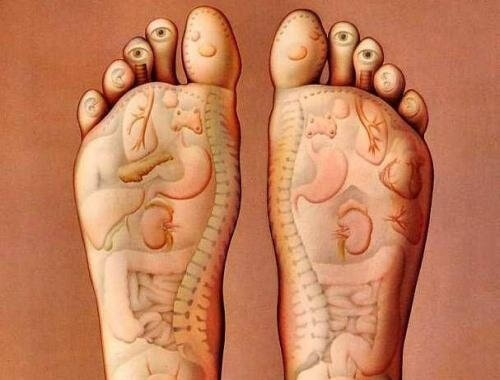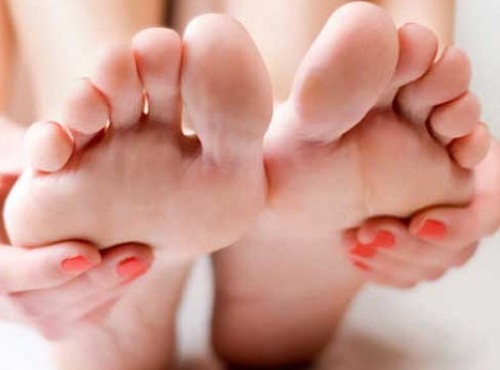What Do Your Feet Say about Your Health?


Reviewed and approved by the pedagogue in physical education and nutritionist Elisa Morales Lupayante
Our feet support the weight of our body all day long, which is why they require extra care. Unfortunately, your feet often don’t get the attention they deserve.
See Also: Train Your Whole Body to Lose Weight
Did you know that you can identify many types of health problems, both physical and emotional, just by examining the feet? This is more than reason enough to give them the necessary care and attention they need to stay healthy. Find out more in this article.
Your Feet and Their Connection to Your Health

One of the easiest ways to check for health problems is by carefully examining the feet for changes. For example:
- In the feet and toes, there are capillaries of varying density, which indicate good circulation and blood supply. When the number of these capillaries decreases, and in some cases nearly disappearing, it can be a sign of poor circulation. This could be caused by ill-fitting shoes or tight socks.
- The sudden and frequent occurrence of foot pain may signal a nutrient deficiency, inadequate hydration, or poor circulation. It’s important to look at the causes and seek the appropriate treatment.
- If foot cramps occur in those who are active or play sports, dehydration is the likely cause. This condition needs to be treated as soon as possible and can be avoided by drinking the recommended daily amount of water and increasing your fluid intake when active. If dehydration isn’t responsible, it’s more thank likely a deficiency in one of these nutrients: potassium, calcium or magnesium.
- Another sign that something is wrong: a sore that never seems to heal. This can be a sign of diabetes, as people with this condition suffer permanent damage to the nerves in the extremities and have greater difficulty healing wounds or ulcers.
- Constantly cold feet are a sign that your thyroid isn’t functioning properly and you could be suffering from hyperthyroidism. Another cause of this condition could be related to poor circulation. You should seek medical advice to determine the exact cause of this issue.
- Swollen feet are often the result of poorly functioning kidneys and fluid retention. Certain medications can also cause swollen feet as a secondary side effect.
Don’t forget!
It’s important to pay attention to changes in the feet and to seek medical attention when necessary as changes in their condition can signal a potential health problem. As we all know, it’s better to be safe than sorry. Pay attention to what your body is trying to tell you… it could be warning you that something is wrong!
All cited sources were thoroughly reviewed by our team to ensure their quality, reliability, currency, and validity. The bibliography of this article was considered reliable and of academic or scientific accuracy.
-
Bustos Saldaña, R., & Prieto Miranda, S. (2009). Factores de riesgo de ulceración de los pies en diabéticos tipo 2. Revista Médica Del Institudo Mexicano Del Seguro Social.
-
Tizón Bouza, E., Dovale Robles, M. N., Fernández Garcia, M. Y., Fernández Veiga, C., López Vilela, M., Mouteira Vázquez, M., … Vázquez Torrado, R. (2004). Atención de enfermería en la prevención y cuidados del pie diabético. Atencion Primaria. https://doi.org/10.1157/13066406
-
Calatayud, J. L. R. (2015). Pie diabético. Abordaje multidisciplinar. FMC Formacion Medica Continuada En Atencion Primaria. https://doi.org/10.1016/j.fmc.2015.02.021
- Daniel López López, Ricardo García Mira, Francisco Alonso Tajes, Luis López López (2010). Profile Analysis and Lifestyle of people with foot pathologies. Revista Internacional de Ciencias Podológicas. Vol. 4, Núm. 2. 2010, 49-58. https://www.researchgate.net/profile/Ricardo_Garcia-Mira/publication/277769073_Analisis_del_perfil_y_estilo_de_vida_de_las_personas_con_patologias_en_los_pies/links/57bb3ed708aefea8f0f44d8d/Analisis-del-perfil-y-estilo-de-vida-de-las-personas-con-patologias-en-los-pies.pdf
- Mª Elena Arnáiz García, David Alonso Peña, José Andreu Medina, Alfonso Martínez Nova, Javier Arnáiz García (2010). ARTERIOPATÍA PERIFÉRICA PIES EN RIESGO. Revista Española de Podología. https://pdfs.semanticscholar.org/0abd/c5e139cdb0e84621f236d4940e15d6725068.pdf
- Monderer, R., Wu, W. and Thorpy, M., 2010. Nocturnal Leg Cramps. Current Neurology and Neuroscience Reports, 10(1), pp.53-59.
- JAVIER MAQUIRRIAIN y MARCELO J. MERELLO (2005). Abordaje clínico del deportista con calambres musculares. Rev Asoc Argent Ortop Traumatol., pp 367-372. http://www.aaot.org.ar/revista/2005/n4_vol70/art13.pdf
- Mayo Clinic en línea: https://www.mayoclinic.org/es-es/diseases-conditions/claudication/symptoms-causes/syc-20370952?p=1
- Presión arterial alta en el embarazo, MEDLINE PLUS en línea: https://medlineplus.gov/spanish/highbloodpressureinpregnancy.html
- Calambre muscular, MEDLINE en línea: https://medlineplus.gov/spanish/ency/article/002066.htm
This text is provided for informational purposes only and does not replace consultation with a professional. If in doubt, consult your specialist.








